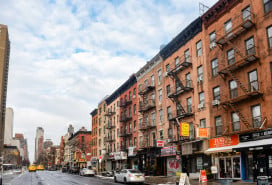A historic vote for rent-stabilized tenants--but what does it really mean?

Unless you've been living under a rock (or a pile of work, as the case may be), you've probably heard that, this week, the Rent Guidelines Board voted on rent increases for rent-stabilized units.
And perhaps unsurprisingly--since it tackles the contentious issue of affordable housing--the vote has created quite the stir.
The basics:
Mayor Bill de Blasio had called for the RGB--a panel that's responsible for setting the rents on more than 1 million rent-stabilized apartments in the city--to implement a rent freeze for stabilized units. But on Monday night, the board voted to raise the rents, albeit by the smallest increment in the board's 45-year history.
The ramifications for you, the renter:
If you're a rent-stabilized tenant and are renewing your one-year lease between Oct. 1, 2014 and Sept. 30, 2015, you'll see a 1 percent jump, while two-year renewals can increase 2.75 percent. (The board had mulled raising the rent up to 3 percent on a one-year lease and 4.5 percent on a two-year lease.)
If you have a monthly rent of $1,500, you'll see your rent bumped up to $1,515 a month next year or $1,541 in two years.
To many market-rate tenants, that kind of increase might sound like a dream--especially since landlords can raise rents on non-regulated apartments by as much as their hearts desire, and double-digit percentage increases aren't unheard of.
But Katie Goldstein, of the Tenants & Neighbors advocacy group, points out in a statement that "a third of rent-stabilized tenants are paying over 50 percent of their income towards rent and this decision will likely increase that amount.”
She adds: “The RGB had an opportunity to begin a course correction to make up for past high increases that have contributed to the affordability crisis, and didn’t."
Even market-rate tenants may be affected by the ruling. Patrick Siconolfi, the president of the Community Housing Improvement Program, a trade group for landlords of rent-stabilized apartments, has already threatened that they'll have to raise rents on other units to make up for the shortfall and offset the costs of rising property taxes. The vote "means that the majority of New Yorkers will have to pay more in their rent and taxes to subsidize stabilized tenants," he said in a statement Monday.
Of course, whether that plays out as he predicts remains to be seen.
Dig deeper:
Rent Guidelines board approves lowest-ever rent increases (Curbed)
Zero tolerance for zero (NYDN)
What does a 1% increase do? (Other than irritate virtually everyone) (NYO)
De Blasio disagrees with rent increase (Crain's)
Related:
De Blasio's big affordable housing moment (and a rent freeze?) -- what does it all mean for you?
After a brief detour, Manhattan landlords "back in the driver's seat"


























